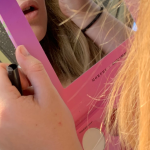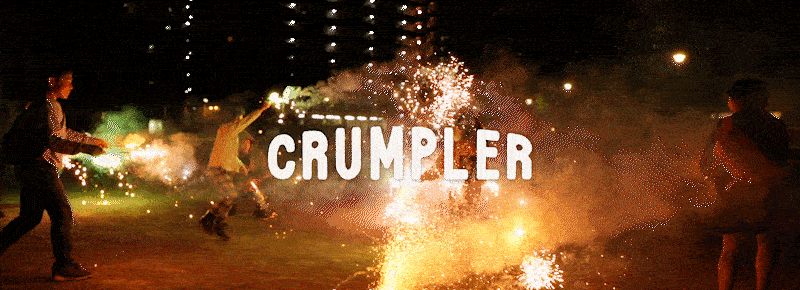She performs with infectious joy and a playful sound that enchants audiences.
Dublin Rose is an emerging Aussie indie music artist with pop and folk flavours spicing up her music.
With her band’s win at the QUT Guild x Glass Battle of the Bands, Dublin is slugging it in the studio recording a new EP with an unannounced released date…
Rose and her band are QUT students working with Vermilion Records to bring you her music and live performances.
Vermilion Records is a not-for-profit, student-run record label based out of QUT. Their roster of young, emerging talent are current students and alumni of QUT, as well as other local musicians.
I sat down with Dublin and her band to chat about how they came to be a band, their vision and their recent victory.
—
BEN: So, Dublin, run me through it – how have you started out as an artist?
DUBLIN: I’ve been playing music for like my whole life. I started busking at the markets when I was 12 and did like solo stuff as a singer like and guitarist. But then at the start of this year, I got chosen as an artist for QUT’s Vermilion Records. And that’s how I met the boys.
B: Wait, you met at Vermilion? How does that work?
D: These guys are actually my producers. These guys are in Vermilion. It was just sort of such a perfect thing that it became a band.
SAMMY: In Vermillion, people have to jump to a lot of different things. I don’t know I think I’m a decent example because I have a hand in a bunch of stuff. But people will have to often play for their artists.
B: What drew you guys together? Was it love at first sight?
D: Well, on one of the first days, all the artists were meant to meet but it was on such short notice and some of the artists couldn’t come. I was already assigned a team and these guys were already assigned an artist. But their artist couldn’t go to that first meeting, so they came along to my session.
PAT: Yeah, our original artist wasn’t going to be able to come for a couple of weeks. So, we stuck on Dublin’s session and thought it was really fun and we stuck around.
D: And we all got shuffled around, and they became the team!

B: What is your musical vision and direction? How do we come up with music?
D: I’ve written a bunch on my own in my bedroom with my guitar over the past couple years. Then I’ve just like, shown it to the band, and then they’ll love it and add parts that make it like 10 million times cooler.
P: We had a couple of days where we just kind of sat there for two hours and only do one song. We’d just nut out all the little bits and pieces and bounce off each other. And by the end of it, the song was just sounding so much better. There is also an element of translating what each other means when we ask someone to try something.
S: There’s definitely a very specific Dublin Rose vocabulary that we are working out slowly. There’s the classic ‘revolutionary’ that doesn’t actually mean revolutionary, but you know, we’ll get there eventually.
P: Jake is also a culprit of that. There was one time in the studio he just kept saying ‘Get rid of the double kick’ … I was never playing a double kick.
JAKE: Yeah, you were playing a double snare or something.
P: I just kept trying different things and ended starting to play a double kick and that was what Jake wanted.
B: So, playing live, how do we like it?
P: Playing live is just so different. You can practice all you want in the rehearsal, but it’s always just so much better when you’re onstage. Like when we were practising for QUT Guild x Glass Battle of the Bands, we practised for two/three hours that day, and it sucked. It was awful.
B: Yeah, because you wouldn’t be getting any energy back.
D: It’s funny, like in the rehearsal, we were like ‘Damn, like, we’re getting this tempo so wrong.’ It’d feel like we were too slow, then we’re going too fast. But then when you’re on stage, it just feels so natural you don’t even think about it.

B: So, the Battle of the Bands – what was it like to prep your set?
S: Our set list went through some modifications … a lot actually … it went through a lot of modifications. It was a lot of discussion about pacing and what to put where. And then we went through a lot of cover changes before we ended up with The Only Exception.
B: Such a good choice by the way.
D: It was all Jake’s idea.
J: It’s a funny story. Dublin played one chord on guitar in rehearsal, and I was just like, ‘What’s that song?’ And it was the opening chord for The Only Exception. And I thought that’s it, that’s the song.
B: Were there any other covers that you were thinking about?
S: There were so many. It was probably the thing we spent the most time figuring out. There was one that we liked but it was just a little to challenging…
D: Yeah, Is This How You Feel? by The Preatures…
B: NO! Don’t tell me that! That would have been so good!
D: I know! Like we didn’t sound but the original is just so good.

B: Now the Grand Final was an intense night, did you guys feel that momentum towards the end of the competition?
P: The first one we played was pretty quiet and I got the impression that people that people were there just for a drink, and we happened to be playing. But by the end of it, people were just there for the music.
B: So again, congratulations on the win! What are we doing with the prize money?
D: Well, we have a band bank account now! We’re gonna put the money towards getting our music properly mastered and get some good advertising.
—
If you want to hear the whole interview, I chatted to the band for the TalkerSpace: Approved Extension podcast. Check it out here:







